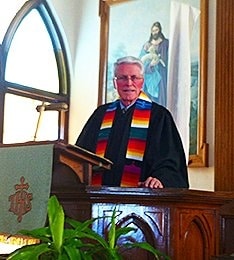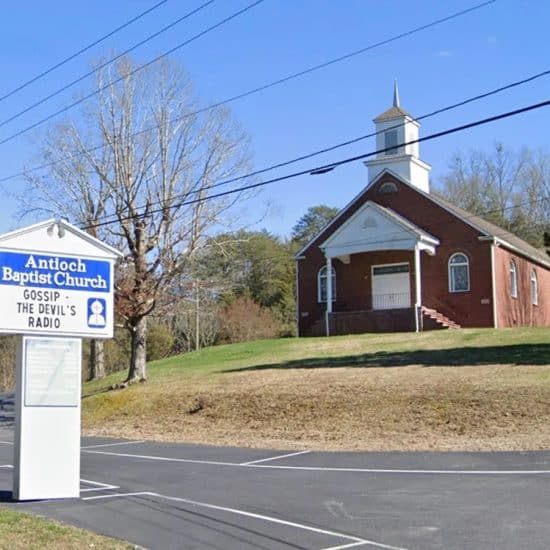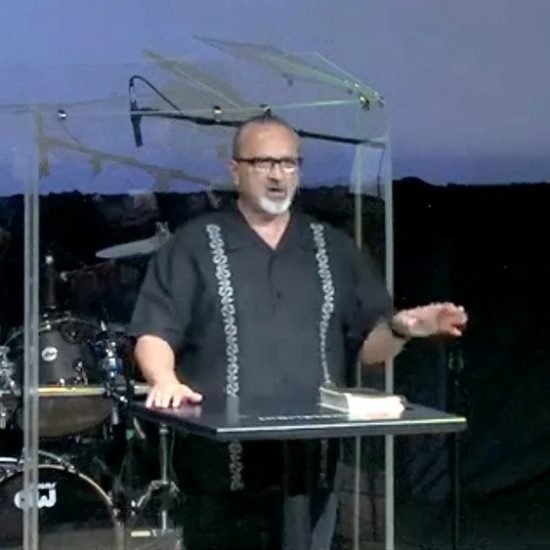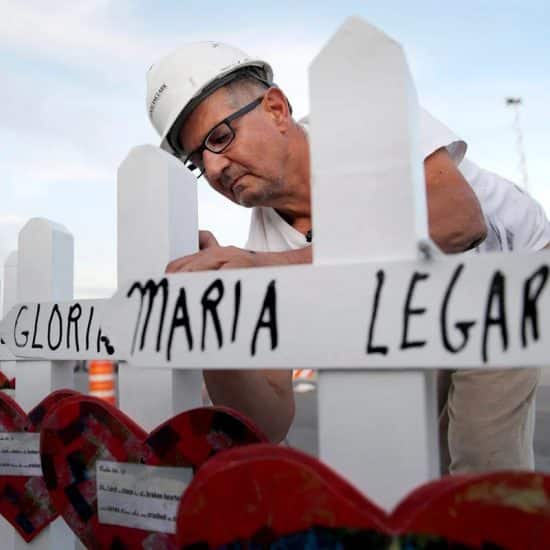
Michael Olmsted didn’t have to pray too long about serving as interim pastor — even though the congregation is affiliated with a different denomination.

A Baptist minister for more than 45 years, Michael Olmsted dons robes as interim pastor of St. John’s United Church of Christ. (Nan Olmsted photo)
|
A pastor for 45 years, Olmsted did not walk away from ministry after retiring as senior pastor of University Heights Baptist Church in Springfield, Mo. Instead, he has done supply preaching and interim work for other Baptist congregations.
But last August, members of St. John’s United Church of Christ in Springfield realized they would need help. Then-pastor Sol Codillo Jr. resigned after being diagnosed with cancer, with a prognosis of about seven months.
Members wanted someone to preach and to help them deal with grief when it came. A man who had known Olmsted for 30 years suggested church leaders contact him.
Codillo passed away in the Philippines, where he was born, on June 15. The Springfield church held a celebration of his life on Aug. 2. He had continued to worship at St. John’s, and he and Olmsted bonded as friends and ministers, Olmsted said.
Founded in 1887, St. John’s is the oldest continually functioning church in Springfield, Olmsted said. The first Sunday he preached there last August, he realized he already knew about half of the small congregation because he had been active in the community, as pastor at University Heights and through other civic affairs.
Early in his ministry, Olmsted had learned to look at several aspects of a church — history, budget and demographics — before agreeing to become its pastor. Later, he discovered he also needed to measure a congregation by what the members thought and what moved them to action. “I want to see what they are involved in,” he explained.
With about 35 members in a changing neighborhood, St. John’s congregation is involved in a lot.
An old St. John’s hospital building across the street from the church now is used as a residential facility for older adults and others with special needs. Church members minister through several projects for residents, including organizing lunches and supplying non-perishable food items.
They minister to teens on the street, and two or three times each year the congregation hosts a free bingo party and meal for the neighborhood. Members also participate in the Springfield-based Council of Churches of the Ozarks.
Olmsted met with the church council that first Sunday to clarify expectations. The United Church of Christ has a more structured hierarchy, calling it a “covenantal polity,” than do most Baptist groups.
Council members responded that they wanted an interim to help them through the grief process and to be an encouragement. When Olmsted pressed them for specifics, they said, “We want someone to love and respect us…and to preach the Word without apology.”
Olmsted has tried to do that. He hasn’t experienced conflict between the denominational differences, he said, primarily because of his upbringing and background. The UCC services are “very liturgical” and “very ordered,” Olmsted explained.
The denomination has a more structured approach to ordination and ministerial credentialing. It practices infant baptism and children go through confirmation.
Growing up in the Lutheran tradition, Olmsted was accustomed to liturgy and confirmation. Also, his grandparents attended a large Congregational church in Chicago. Because his father was in the military, Olmsted had moved several times and often attended chapel on military installations. His family attended a Presbyterian church in one town in which they had lived.
Olmsted chose to become a Baptist while in high school. His father’s career brought the family to Sheppard Air Force Base in Wichita Falls, Texas, when Olmsted was a senior. Mad at God because of the move, he visited the chaplain in charge of the base chapel youth group, who suggested they study the Bible together an hour each week for a year. At the young man’s insistence, the chaplain finally suggested Olmsted might feel most at home in a Baptist church.
And Baptist groups don’t always practice the autonomy they espouse. “Baptists talk about freedom…yet in so many instances [in local churches], we work with a [deacon] board that actually makes the decisions,” he said.
Olmsted declared he is “still a Baptist by conviction,” and made that clear to St. John’s leaders. He has had no problem there, partly because its members “have an autonomous view of themselves,” he said. If should a need arise, such as an infant baptism, he would ask the church to contact a UCC pastor to handle it.
Olmsted said he stresses the personal relationship with Jesus Christ. Several members have shared with him that pastors who led their confirmation classes emphasized the relationship between Jesus and believers and that the church becomes family for Christians.
“If we can get beyond all the denominational barriers we’ve built up…it’s amazing how much we have in common,” Olmsted explained. “I wish all of us could get to that point….
“The key is do we want to be the presence of Christ…. If we do, then we must put aside differences…and rigidity,” he said.
Faith, he added, “is not something we believe but something we become.”






